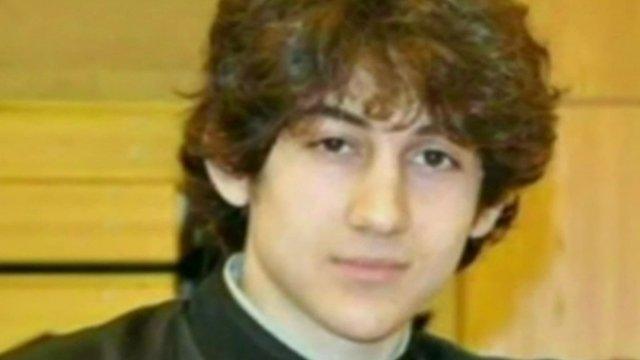Bostonians hope to 'find some peace' after Tsarnaev verdict
- Published
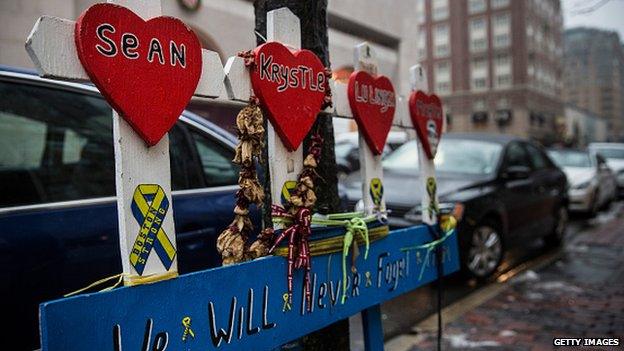
In January a wooden memorial marked the spot of the bomb blast
Jurors find Dzhokhar Tsarnaev guilty of crimes related to the Boston Marathon bombing, and Bostonians say they're satisfied. Still the next phase of the trial - a possible death sentence - could be the hardest.
Lindsey Gaudet, a business analyst, said she thinks about what happened every time she walks past Lord & Taylor on Boylston Street and feels a wave of sadness.
She remembers the people who were killed in the explosions on the street on on 15 April 2013 and the chaos that followed during the manhunt.
When walking through the area, she said: "You take like a deep breath, and you say, 'I'm alive.'"
On Wednesday, Tsarnaev was found guilty of all 30 counts against him.
"He did it," Gaudet said. "I'm glad that someone has been held accountable."
Elizabeth Chaplin, a partner with Boston Collegiate Consulting Group, was at the marathon on that day and feels relieved about the verdict.
"It closes the book," she said.
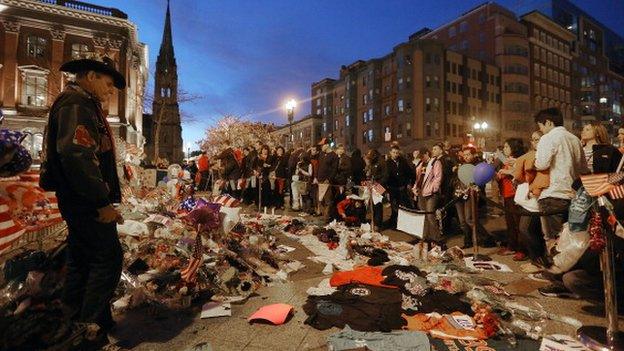
After the bombing, makeshift memorials went up across the city
For many people in Boston, it has been a long wait.
The bombings took place nearly two years ago. Martin Richard, 8, was killed. So was Lu Lingzi, a graduate student at Boston University, and Krystle Campbell, 29, a restaurant manager. More than 260 people were injured.
Afterwards, according to prosecutors, brothers Tamerlan and Dzhokhar Tsarnaev shot and killed Officer Sean Collier of the MIT Police Department. Tamerlan died in the mayhem that followed.
Nearly everyone in the city was affected by the bombings, the shootings and the manhunt for the brothers. It's hard to exaggerate how much it means to people - and how devastating the attacks were.
Describing the verdict, Frances Jafarzadeh, a flight attendant for American Airlines, said: "It's emotional for a lot of people."
The marathon is part of the city - different generations take part, and everyone gathers together for the event.
"Anybody from the Boston area has been to the marathon at least once," she said. "Somebody's always training in your family."
People have been watching the trial closely, following exhaustive Twitter feeds that tracked the minutiae of the legal proceedings.
On Boylston Street, Lamont DePew pointed to a patch of dirt. He was on break from his shift as a manager at a Summer Shack restaurant, where Campbell once worked.
"It was right there," he said. "Yup."
Tsarnaev was captured by a video camera on the roof of Lord & Taylor. In the video he was wearing a white cap. He stood in front of the Forum restaurant and put a black backpack on the ground near a small tree.
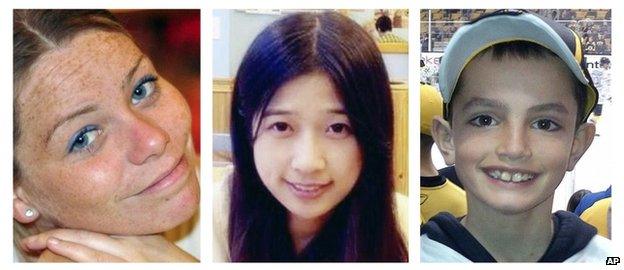
Krystle Campbell, Lu Lingzi and Martin Richard were killed by the blast
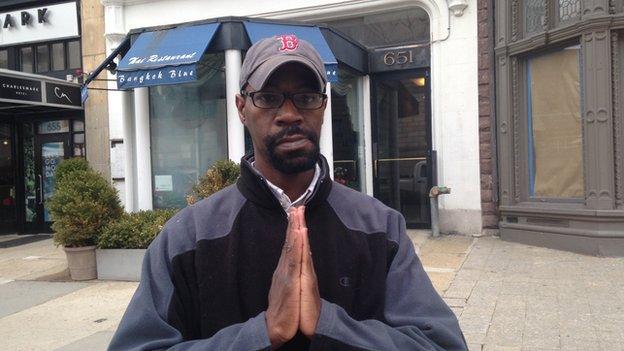
"If he gets life or death - it's not up to me," said Lamont DePew who works near the site of the bombings
A moment later the bomb exploded.
Since then the roads have been repaved. The windows where the Forum restaurant was located are now smeared in soap. The place is being rebuilt.
A sapling has taken root in the dirt where Tsarnaev left the bomb.
DePew walked down the street and stopped for a moment. "The finish line is here," he said.
This is close to the place where Campbell and their friend, Karen Rand McWatters, who also worked for Summer Shack, were on the day of the marathon.
McWatters lost her left leg. She held Campbell's hand as she died.
"Obviously I have no love for him for what he did to our friends, but this is really tough," DePew said, referring to Tsarnaev. "If he gets life or death - it's not up to me."
The trial, said Lindsey Gaudet, went by quickly. "It seemed shorter than I thought," she said, "which is a good thing."
Now, she said, things will begin to seem less raw: "It's not that the tragedy will be done, but the trial portion is."
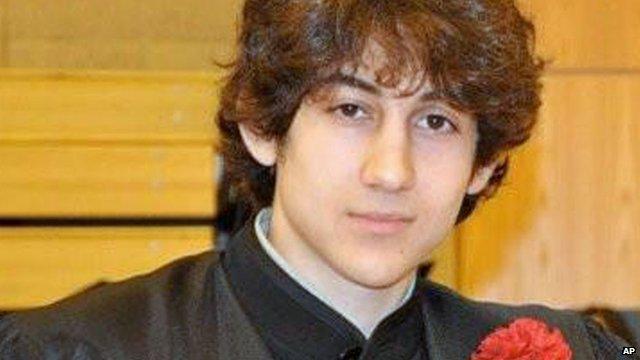
Dzhokhar Tsarnaev, seen in a high school photo, has been found guilty of the Boston Marathon attacks
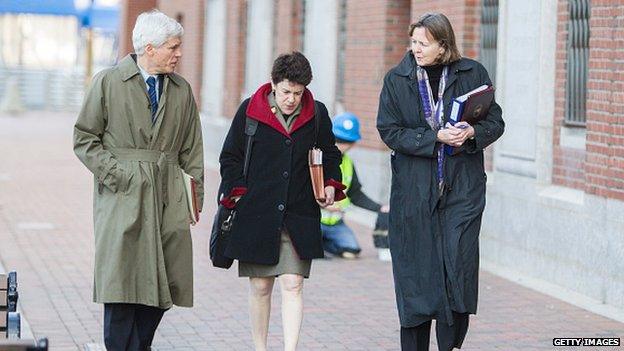
Tsarnaev's legal team tried to move the trial from Boston, arguing that he could not get a fair trial in the city.
She said the guilty verdict marks a turning point and that she is glad the jurors have made a decision.
"It will give some sense of closure for people," said Ronald Sullivan Jr., a Harvard Law professor and director of the school's criminal justice institute. "Healing is a more difficult concept."
In the next phase jurors will decide if Tsarnaev will be put to death.
"I don't think he deserves to live," Elizabeth Chaplin said. "It was an effort to create death to the masses and on such a large scale. That's what makes the death penalty seem like a suitable punishment."
Others struggle with the notion.
"That's crazy," Gaudet said, sitting in a café near the courthouse. She tapped her fingernails on the plastic top of a cup of tea, considering the possibility of a death sentence.
"I'm sure justice will be done - whatever it is," she said, finally. "Let's hope we can find some peace. That's the main thing."
Follow Tara McKelvey, external on Twitter.
- Published8 April 2015
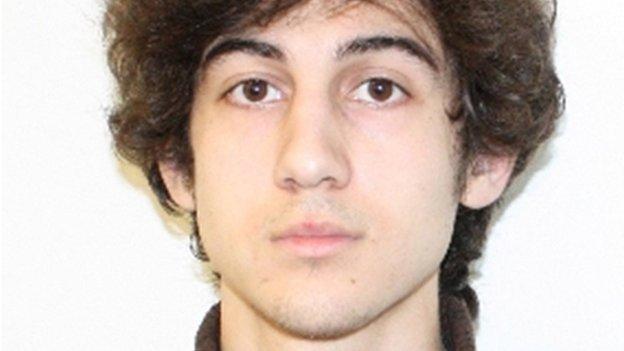
- Published8 April 2015
